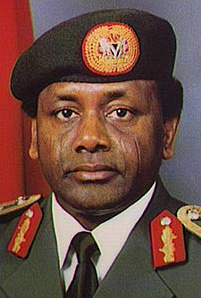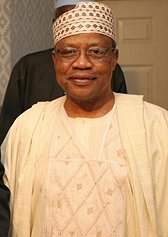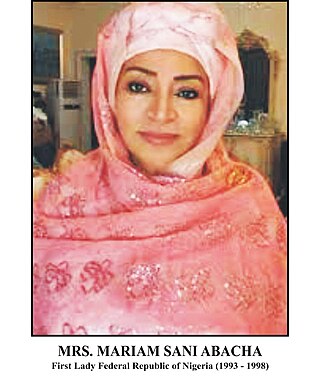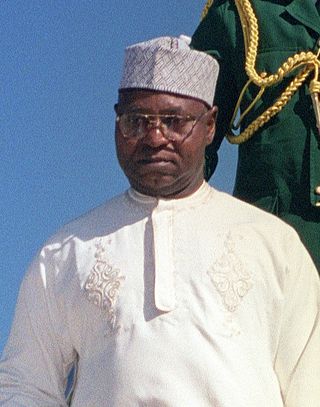Related Research Articles

Sani Abacha;was a Nigerian military dictator and statesman who ruled Nigeria as the military head of state from 1993 following a palace coup d'état until his sudden death in 1998.

Ibrahim Badamasi Babangida is a Nigerian statesman and military dictator who ruled as military president of Nigeria from 1985 when he orchestrated a coup d'état against his military and political arch-rival Muhammadu Buhari,until his resignation in 1993 as a result of the post-12 June 1993 election which he illegally nullified.
Mohammed Abacha is the eldest surviving son of Nigeria's former military ruler,the late general Sani Abacha,and his wife Maryam Abacha.

Dele Giwa was a Nigerian journalist,editor,and founder of Newswatch magazine.
The National Security Organization (NSO) of Nigeria,or Nigerian Security Organization,was created under Decree number 27 of 1976 by the military regime of General Olusegun Obasanjo,after the failed Dimka coup which claimed the life of former Head of State General Murtala Mohammed. The NSO was given a mandate of co-ordinating Internal Security,Foreign Intelligence and counterintelligence activities. It was charged with the detection and prevention of any crime against the security of the state,with the protection of classified materials,and with carrying out any other security missions assigned by the president.

Maryam Abacha;born 4 March 1949) is the widow of Sani Abacha,Nigeria's military ruler from 1993 to 1998.

The Third Republic was the planned republican government of Nigeria in 1992 which was to be governed by the Third Republican constitution. In the Third Republic,there were democratically elected state governors and state assemblies and a democratically elected federal legislature. The republic was however not fully democratic as there was no democratically elected civilian president. The then military president Ibrahim Babangida's supposed transition eventually turned out to be a ploy to keep executive powers and grant the National Assembly limited legislative powers. Hence all laws passed by the Senate and House of Representatives will have to pass the National Defence and Security Council of Nigeria and finally approved by the President. So while Babangida changed the usual style adopted by preceding military leaders from Head of State to president,he will continue to postpone presidential elections and eventually annul the ultimate one held on 12 June 1993. The Third Republic can thus be described as half military and half civilian.
Donaldson Oladipo Oyeyinka Diya,;3 April 1944 –26 March 2023) was a Nigerian general and lawyer who served as Chief of General Staff under military head of state General Sani Abacha from 1994 until his arrest for treason in 1997. He also served as Chief of Defence Staff and as military governor of Ogun State from January 1984 to August 1985.

Abdulsalami Abubakar is a retired Nigerian army general who served as the military head of state of Nigeria from 1998 to 1999. He was also Chief of Defence Staff from 1997 to 1998. He succeeded General Sani Abacha upon the latter's death.
Alhaji Muhammadu Abubakar Rimi was a Nigerian politician who was the governor of Kano State during the Second Nigerian Republic. He also served as Federal Minister of Communications from 1993 to 1995 during the military regime of General Sani Abacha.
Ibrahim Coomassie was a Nigerian police officer and the 9th Inspector General of Nigerian Police serving between 1993 and 1999,under the military governments of Generals Sani Abacha and Abdulsalami Abubakar. He died on Thursday 19 July 2018 after a protracted illness. He was 76 years old.
Dr. Paul Agbai Ogwuma is a Nigerian banker who was Governor of the Central Bank of Nigeria between 1993 and 1999 during the military regime of General Sani Abacha and his successor General Abdulsalami Abubakar.
Lawal Jafaru Isa is a retired Nigerian Army Brigadier General,and was the Military Administrator of Kaduna State from December 1993 to August 1996 during the military regime of General Sani Abacha.
Abdullahi Mohammed is a retired Nigerian Army major general,who served as chief of staff to presidents Olusegun Obasanjo and Umaru Musa Yar'Adua from 1999 to 2008;National Security Adviser to General Abdusalami Abubakar from 1998 to 1999;Director General of the National Security Organization from 1976 to 1979;and Governor of Benue-Plateau State,Nigeria from July 1975 to February 1976 during the military regime of General Murtala Mohammed.
Hameed Ibrahim Ali is a retired army officer and former Comptroller General of the Nigerian Customs Service from 2015 to 2023. He previously served as Military Governor of Kaduna State from 1996 to 1998. After retirement,he became Secretary of the Arewa Consultative Forum a political and cultural association of leaders in Northern Nigeria.

Abubakar Atiku Bagudu is a Nigerian politician who is the current Nigerian minister of budget and economic planning. He served as governor of Kebbi State from 2015 to 2023. He also served as the senator representing the Kebbi Central senatorial district from 2009 to 2015.
Prince Tony Momoh was a Nigerian journalist and a politician who was Nigerian Minister of Information and Culture (1986–1990) during the military regime of General Ibrahim Babangida.
Alex Ibru was a Nigerian businessman,founder and publisher of The Guardian (Nigeria) newspaper,who was minister of internal affairs from 1993 to 1995 during the military regime of General Sani Abacha.
Haliru Akilu is a Nigerian general who was Director of National Intelligence and Director of Military Intelligence at various times in the 1990s.
Maryam Abacha American University of Niger,acronym (MAAUN). It is the first English speaking university in the Republic of Niger and also the first bilingual university in the Sub-Saharan Africa. it is a large private International university situated in Maradi,Niger. second largest city in Niger Republic,is an institution with a wide range of programs,faculties and departments,offering undergraduate and post graduate degrees in Applied and Basic sciences,in Liberal Arts,in Social and Management sciences. It is a university with a population of over ten thousand under graduates and more than five thousand post graduate students.
References
- ↑ Mathews 2002, p. 11.
- ↑ Kolade-Otitoju 1998.
- ↑ Nwonwu & Kotzé 2008, pp. 124–125.
- ↑ Omoigui.
- ↑ Graybill, Thompson & Burkett 1998, pp. 121ff.
- ↑ Onwubiko 2001.
- ↑ Inamete 2001, p. 247.
- ↑ Inamete 2001, p. 268.
- ↑ Olukotun 2004, p. 93.
- ↑ IRBC 1999.
- 1 2 Ojewale 2004.
- ↑ Pieth 2008, pp. 43–44.
- ↑ Lewis 2007, p. 178.
- ↑ Maja-Pearce 2005, p. 110.
- ↑ OECD 2008.
- ↑ BBC 4 November 1998.
- ↑ Columbus & Wusu 2006, p. 127.
- ↑ Nwachuku & Uzoigwe 2004, p. 276.
- ↑ Okonta & Douglas 2003, p. 39.
- ↑ IRIN November 1998.
- ↑ Onojovwo 2008.
- ↑ Council of Europe 2004.
- ↑ Olson 2000.
- ↑ US State Department 2008.
- ↑ US State Department 2001.
- ↑ Oduyela 2000.
- ↑ ThisDay 8 March 2011.
- ↑ Ibrahim 2011.
Sources
- BBC (4 November 1998). "Nigeria's missing millions" . Retrieved 24 June 2011.
{{cite journal}}: Cite journal requires|journal=(help) - Columbus, Frank H.; Wusu, Olufemi (2006). Politics and Economics of Africa, Volume 5. Nova Publishers. ISBN 1-60021-173-9.
- Council of Europe (2004). Combating organised crime: best-practice surveys of the Council of Europe. Council of Europe. ISBN 92-871-5476-7.
- Graybill, Lyn S.; Thompson, Kenneth W.; Burkett, White (1998). Africa's Second Wave of Freedom: Development, Democracy, and Rights. University Press of America. ISBN 0-7618-1071-4.
- Ibrahim, Hassan (10 March 2011). "Arewa denies mobilising generals for Buhari". Nigerian Tribune . Archived from the original on 11 March 2011. Retrieved 24 June 2011.
- Inamete, Ufot Bassey (2001). Foreign Policy Decision-making in Nigeria. Susquehanna University Press. ISBN 1-57591-048-9.
- IRBC (1 February 1999). "Nigeria: Update to NGA30594 of 27 November 1998 on the fate of those said to be involved in the alleged December 1997 coup plot". Immigration and Refugee Board of Canada. Retrieved 24 June 2011.
- IRIN (6–12 November 1998). "Government recovers stolen US$750 million". Office for the Coordination of Humanitarian Affairs – Integrated Regional Information Network. Archived from the original on 27 September 2011. Retrieved 24 June 2011.
- Kolade-Otitoju, Babajide (3 September 1998). "Gwarzo Behind Bars in Gwarzo". Tempo.
- Lewis, Peter (2007). Growing apart: oil, politics, and economic change in Indonesia and Nigeria. University of Michigan Press. ISBN 978-0-472-06980-4.
- Maja-Pearce, Adewale (2005). Remembering Ken Saro-Wiwa and other essays. The New Gong. ISBN 978-38421-0-2.
- Mathews, Martin P. (2002). Nigeria: current issues and historical background. Nova Publishers. ISBN 1-59033-316-0.
- Nwachuku, Levi Akalazu; Uzoigwe, G. N. (2004). Troubled Journey: Nigeria since the civil war. University Press of America. ISBN 0-7618-2712-9.
- Nwonwu, Francis; Kotzé, Dirk (2008). African Political Elites: the search for democracy and good governance. African Books Collective. ISBN 978-0-7983-0184-8.
- Oduyela, Seyi (28 September 2000). "Crumbs From Former National Security Adviser Gwarzo". Tempo. Retrieved 24 June 2011.
- OECD (2008). ADB/OECD Anti-Corruption Initiative for Asia and the Pacific Asset Recovery and Mutual Legal Assistance in Asia and the Pacific. OECD Publishing. ISBN 978-92-64-05572-8.
- Ojewale, Olu (23 February 2004). "Untouchable Looters". Newswatch (Nigeria) . Archived from the original on 12 March 2012. Retrieved 22 June 2011.
- Olson, Elizabeth (26 January 2000). "Swiss Freeze A Dictator's Giant Cache". New York Times . Retrieved 24 June 2011.
- Olukotun, Ayo (2004). Repressive state and resurgent media under Nigeria's military dictatorship, 1988–98. Nordic Africa Institute. ISBN 91-7106-524-5.
- Omoigui, Nowa. "NIGERIA: THE PALACE COUP OF AUGUST 27, 1985 PART II". Urhobo Historical Society. Archived from the original on 18 July 2011. Retrieved 24 June 2011.
- Okonta, Ike; Douglas, Oronto (2003). Where Vultures Feast: Shell, Human Rights, and Oil in the Niger Delta. Verso. ISBN 1-85984-473-1.
- Onojovwo, Dafe (18 June 2008). "Murdering truth". The Punch . Retrieved 24 June 2011.[ permanent dead link ]
- Onwubiko, Emmanuel (4 July 2001). "Tsav links Akilu, Togun with Dele Giwa's death". Nigerian Guardian . Archived from the original on 10 February 2013. Retrieved 24 June 2011.
- Pieth, Mark (2008). Recovering stolen assets. Peter Lang. ISBN 978-3-03911-583-9.
- ThisDay (8 March 2011). "ACF Mobilises Northern Retired Generals for Buhari". ThisDay . Retrieved 24 June 2011.[ permanent dead link ]
- State Department (23 February 2001). "Country Reports on Human Rights Practices – 2000". Bureau of Democracy, Human Rights, and Labor.
- US State Department (2008). Country Reports on Human Rights Practices for 2007. Government Printing Office.